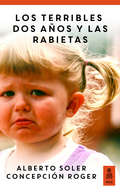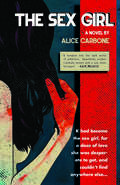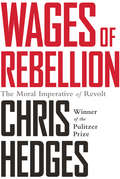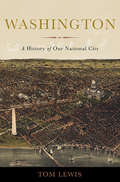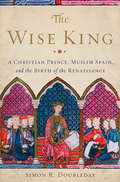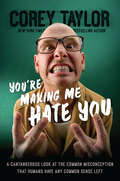- Table View
- List View
Los terribles dos años y las rabietas
by Alberto Soler y Concepción Roger¿Por qué se producen las rabietas? ¿Son todas iguales? En este texto breve, didáctico y riguroso, Alberto Soler responde a estas y otras preguntas y explica cómo manejarlas y prevenirlas. Para profundizar en temas relacionados con la crianza, recomendamos el ebook <i>Hijos y padres felices</i>, de Alberto Soler y Concepción Roger, que incluye “Los terribles dos años y las rabietas”, además de capítulos dedicados a la alimentación, el sueño, la guardería, las pantallas y los estilos parentales, entre otros.
TheSexGirl
by Alice CarboneIn 1994, one month after the Northridge earthquake and two years after the riots, K moves to Los Angeles to escape her demons. That's the thing about demons though, they tend to follow. At once honest and heartbreaking, The Sex Girl digs deep into the female psyche, dealing with addiction, sex, love, and friendship. K's story, and the unique way in which it's told adds a new literary voice to the mix. Alice Carbone's fresh take on the drug addiction novel, earns a place amongst the tortured junkies. With a sense of impending tragedy, Carbone weaves K's life together through found diaries and recollections, and in doing so she unpacks the density of a single person's story.
Toevallige ontmoetingen: Bio-ethiek voor een gehavende planeet
by Kristien HensIn dit rigoureuze en noodzakelijke boek brengt Kristien Hens bio-ethiek en filosofie van de biologie bij elkaar, met het argument dat het ethisch noodzakelijk is om in het wetenschappelijk onderzoek een plaatsje vrij te houden voor de filosofen. Hun rol is behalve ethisch ook conceptueel: zij kunnen de kwaliteit en de coherentie van het wetenschappelijk onderzoek verbeteren door erop toe te zien dat specifieke concepten op een consistente en doordachte manier worden gebruik binnen interdisciplinaire projecten. Hens argumenteert dat toeval en onzekerheid een centrale rol spelen in de bio-ethiek, maar dat die in een spanningsrelatie kunnen raken met de pogingen om bepaalde theorieën ingang te doen vinden als wetenschappelijke kennis: bij het beschrijven van organismen en praktijken creëren we op een bepaalde manier de wereld. Hens stelt dat dit noodzakelijk een ethische activiteit betreft.
Translating Russian Literature in the Global Context
by Muireann Maguire Cathy McAteerTranslating Russian Literature in the Global Context examines the translation and reception of Russian literature as a world-wide process. This volume aims to provoke new debate about the continued currency of Russian literature as symbolic capital for international readers, in particular for nations seeking to create or consolidate cultural and political leverage in the so-called ‘World Republic of Letters’. It also seeks to examine and contrast the mechanisms of the translation and uses of Russian literature across the globe. This collection presents academic essays, grouped according to geographical location, by thirty-seven international scholars. Collectively, their expertise encompasses the global reception of Russian literature in Europe, the Former Soviet Republics, Africa, the Americas, and Asia. Their scholarship concentrates on two fundamental research areas: firstly, constructing a historical survey of the translation, publication, distribution and reception of Russian literature, or of one or more specific Russophone authors, in a given nation, language, or region; and secondly, outlining a socio-cultural microhistory of how a specific, highly influential local writer, genre, or literary group within the target culture has translated, transmitted, or adapted aspects of Russian literature in their own literary production. Each section is prefaced with a short essay by the co-editors, surveying the history of the reception of Russian literature in the given region. Considered as a whole, these chapters offer a wholly new overview of the extent and intercultural penetration of Russian and Soviet literary soft power during the twentieth and twenty-first centuries. This volume will open up Slavonic Translation Studies for the general reader, the student of Comparative Literature, and the academic scholar alike.
Wages of Rebellion
by Chris HedgesIn the face of modern conditions, revolution is inevitable. The rampant inequality that exists between the political and corporate elites and the struggling masses; the destruction wreaked upon our environment by faceless, careless corporations; the steady stripping away of our civil liberties and the creation of a monstrous surveillance system--all of these have combined to spark a profound revolutionary moment. Corporate capitalists, dismissive of the popular will, do not see the fires they are igniting. In Wages of Rebellion, Chris Hedges--a renowned chronicler of the malaise and sickness of a society in terminal moral decline--investigates what social and psychological factors cause revolution and resistance. Focusing on the stories of radicals and dissenters from around the world and throughout history, and drawing on an ambitious overview of prominent philosophers, historians, and novelists, Hedges explores what it takes to be a rebel in modern times. Hedges, using a term coined by the theologian Reinhold Niebuhr, cites "sublime madness” as the essential force that guides the actions of rebels--the state of passion that causes the rebel to engage in an unwavering fight against overwhelmingly powerful and oppressive forces. From South African activists who dedicated their lives to ending apartheid, to contemporary anti-fracking protestors in Canada, to whistleblowers in pursuit of transparency, Wages of Rebellion shows the cost of a life committed to speaking truth to power and demanding justice. This is a fight that requires us to find in acts of rebellion the sparks of life, an intrinsic meaning that lies beyond the possibility of success. For Hedges, resistance is not finally defined by what we achieve, but by what we become.
Washington: A History of Our National City
by Tom LewisOn January 24, 1791, President George Washington chose the site for the young nation’s capital: ten miles square, it stretched from the highest point of navigation on the Potomac River, and encompassed the ports of Georgetown and Alexandria. From the moment the federal government moved to the District of Columbia in December 1800, Washington has been central to American identity and life. Shaped by politics and intrigue, poverty and largess, contradictions and compromises, Washington has been, from its beginnings, the stage on which our national dramas have played out. In Washington, the historian Tom Lewis paints a sweeping portrait of the capital city whose internal conflicts and promise have mirrored those of America writ large. Breathing life into the men and women who struggled to help the city realize its full potential, he introduces us to the mercurial French artist who created an ornate plan for the city “en grande”; members of the nearly forgotten anti-Catholic political party who halted construction of the Washington monument for a quarter century; and the cadre of congressmen who maintained segregation and blocked the city’s progress for decades. In the twentieth century Washington’s Mall and streets would witness a Ku Klux Klan march, the violent end to the encampment of World War I “Bonus Army” veterans, the 1963 March on Washington for Jobs and Freedom, and the painful rebuilding of the city in the wake of Martin Luther King, Jr. ’s assassination. “It is our national center,” Frederick Douglass once said of Washington, DC; “it belongs to us, and whether it is mean or majestic, whether arrayed in glory or covered in shame, we cannot but share its character and its destiny. ” Interweaving the story of the city’s physical transformation with a nuanced account of its political, economic, and social evolution, Lewis tells the powerful history of Washington, DC—the site of our nation’s highest ideals and some of our deepest failures.
William Moorcroft, Potter: Individuality by Design
by Jonathan MallinsonWilliam Moorcroft (1872-1945) was one of the most celebrated potters of the early twentieth century. His career extended from the Arts and Crafts movement of the late Victorian age to the Austerity aesthetics of the Second World War. Rejecting mass production and patronised by Royalty, Moorcroft’s work was a synthesis of studio and factory, art and industry. He considered it his vocation to create an everyday art, both functional and decorative, affordable by more than a privileged few: ‘If only the people in the world would concentrate upon making all things beautiful, and if all people concentrated on developing the arts of Peace, what a world it might be,’ he wrote in a letter to his daughter in 1930.
The Wise King: A Christian Prince, Muslim Spain, and the Birth of the Renaissance
by Simon R. Doubleday"If I had been present at the Creation,” the thirteenth-century Spanish philosopher-king Alfonso X is said to have stated, "Many faults in the universe would have been avoided. ” Known as El Sabio, "the Wise,” Alfonso was renowned by friends and enemies alike for his sparkling intellect and extraordinary cultural achievements. In The Wise King, celebrated historian Simon R. Doubleday traces the story of the king’s life and times, leading us deep into his emotional world and showing how his intense admiration for Spain’s rich Islamic culture paved the way for the European Renaissance. In 1252, when Alfonso replaced his more militaristic father on the throne of Castile and León, the battle to reconquer Muslim territory on the Iberian Peninsula was raging fiercely. But even as he led his Christian soldiers onto the battlefield, Alfonso was seduced by the glories of Muslim Spain. His engagement with the Arabic-speaking culture of the South shaped his pursuit of astronomy, for which he was famed for centuries, and his profoundly humane vision of the world, which Dante, Petrarch, and later Italian humanists would inherit. A composer of lyric verses, and patron of works on board games, hunting, and the properties of stones, Alfonso is best known today for his Cantigas de Santa María (Songs of Holy Mary), which offer a remarkable window onto his world. His ongoing struggles as a king and as a man were distilled--in art, music, literature, and architecture--into something sublime that speaks to us powerfully across the centuries. An intimate biography of the Spanish ruler in whom two cultures converged, The Wise King introduces readers to a Renaissance man before his time, whose creative energy in the face of personal turmoil and existential threats to his kingdom would transform the course of Western history.
With and Without Galton: Vasilii Florinskii and the Fate of Eugenics in Russia
by Nikolai KrementsovIn 1865, British polymath Francis Galton published his initial thoughts about the scientific field that would become ‘eugenics.’ The same year, Russian physician Vasilii Florinskii addressed similar issues in a sizeable treatise, entitled Human Perfection and Degeneration. Initially unheralded, Florinskii’s book would go on to have a remarkable afterlife in twentieth- and twenty-first-century Russia. <p><p> In this lucid and insightful work, Nikolai Krementsov argues that the concept of eugenics brings together ideas, values, practices, and fears energised by a focus on the future. It has proven so seductive to different groups over time because it provides a way to grapple with fundamental existential questions of human nature and destiny. With and Without Galton develops this argument by tracing the life-story of Florinskii’s monograph from its uncelebrated arrival amid the Russian empire’s Great Reforms, to its reissue after the Bolshevik Revolution, its decline under Stalinism, and its subsequent resurgence: first, as a founding document of medical genetics, and most recently, as a manifesto for nationalists and racial purists. <p> Krementsov’s meticulously researched ‘biography of a book’ sheds light not only on the peculiar fate of eugenics in Russia, but also on its convoluted transnational history, elucidating the field’s protean nature and its continuing and contested appeal to diverse audiences, multiple local trajectories, and global trends. It is required reading for historians of eugenics, science, medicine, education, literature, and Russia, and it will also appeal to the general reader looking for a deeper understanding of this challenging subject.
You're Making Me Hate You: A Cantankerous Look at the Common Misconception That Humans Have Any Common Sense Left
by Corey TaylorIn the tradition of the late great George Carlin, New York Times bestselling author and lead singer of Slipknot and Stone Sour Corey Taylor sounds off in hilarious fashion about the many vagaries of modern life that piss him off. Whether it’s people’s rude behavior in restaurants and malls, the many indignities of air travel, eye-searingly terrible fashion choices, dangerously clueless drivers, and--most of all--the sorry state of much modern music, Taylor’s humor and insight cover civil society’s seeming decline--sparing no one along the way, least of all himself. Holding nothing back and delivered in Taylor’s inimitable voice, You’re Making Me Hate You is a cathartic critique of the strange world in which we find ourselves.
